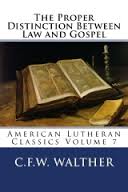Everybody should read this book – Pastors should probably read it everyday, need at least a portion of it but it is a good read for laypeople as well. Pastors can easily wander off the reservation when they try and distinguish between the Law and the Gospel. You can order a new version from Concordia Publishing and it is worth the price.
This comes from a meditation and insights into Walther’s Thesis on Law and Gospel XVIII. I preached on Pauls’ talk about the Law and Sunday and I needed to get this out for my own sake. The Law and sin can confuse us on occasion
God speaks nothing but judgment upon those who are not in Christ Jesus. But to those who are in Christ Jesus there is no condemnation. Therefore, even though they daily sin much and, indeed, deserve nothing but punishment, it is equally true that it is not they that sin, but sin which dwells in them. The Christian’s anguish is not, therefore, a kind of despair beneath the wrath of a still-angry God, but a painful yearning to be delivered from the fleshly body of death which prevents him from doing the good that he wants to do and which compels him to do the evil that he does not want to do. Here is where Luther’s insights into the Christian as a man simul justus et peccator (at the same time just and a sinner) becomes a valuable guide to the evangelical preacher. The Christian as peccator is indeed a transgressor of the Law and must be told so. But this same Christian—justus because God Himself has pronounced him so—is free from both the power and the condemnation of sin. He is to be addressed as one who shares God’s hatred of sin, not as a willing servant of sin. Evangelical preaching does not attempt, therefore, by enumerating sins to drive the believer to despair. Its purpose, rather, is to warn the believer against the power of the flesh which still wars against the spirit within him, and to remind him of his need for those means of grace through which the heavenly Father has promised to renew his strength. So long as he continues to avail himself of these means of grace, it is to be assumed that he is a fellow believer, however strong the flesh may still appear to be within him. The judgment that he has become a heathen man and a publican is not properly based upon the nature of his transgressions but upon a contemptuous attitude
toward the means of grace.


